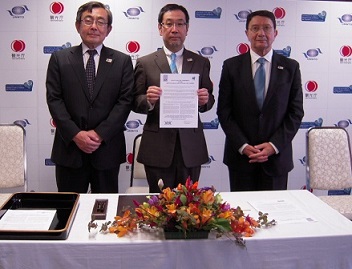On behalf of Okinawa Tourist Service Inc. (OTS), Mr. Yoshikazu Higashi (Chairman & CEO), signed the Private Sector Commitment to the Global Code of Ethics for Tourism on 25 September 2014 at JATA Tourism Expo Japan 2014.
Global Code of Ethics is bedrock global tourism
The World Tourism Organization (UNWTO) is a United Nations agency responsible for the promotion of responsible, sustainable and universally accessible tourism. In 2011, UNWTO formulated the Private Sector Commitment to the Global Code of Ethics for Tourism that private enterprises worldwide were invited to sign on.
Okinawa Tourist Service, OTS, sees its mission as a company that aims to promote sustainable tourism, serving as a link between travelers and their destinations. OTS has been a signatory to the Global Code of Ethics for Tourism since Sep. 25th, 2014, when OTS Chairman and CEO Yoshikazu “Tony” Higashi signed the document at JATA Tourism Expo 2014 during the Japan Travel Week.
In signing the commitment, companies pledge to uphold, promote and implement the values of responsible and sustainable tourism development as defined by the Code.
They also promise to report on their implementation of the Code’s principles in their corporate governance to the World Committee on Tourism Ethics. A special focus on social, cultural and economic matters is one of the main objectives of the Commitment, which draws particular attention to issues such as human rights, social inclusion, gender equality, accessibility, and the protection of vulnerable groups and host communities.
As of December 2017, 539 companies and associations from 68 countries around the world and four regional associations from Latin America and Europe have signed the Private Sector Commitment to the Code of Ethics.
The code presents a fundamental frame of reference for responsible and sustainable tourism. It’s a comprehensive set of principles designed to guide key-players in tourism development that is addressed to governments, travel industry, communities and tourists alike. It aims to help maximize the sector’s benefits while minimizing its potentially negative impact on the environment, cultural heritage and societies across the globe. It features a voluntary implementation mechanism through its recognition of the role of the World Committee on Tourism Ethics (WCTE), to which stakeholders may refer matters concerning the application and interpretation of the document. The Code has 10 principles that cover the economic, social, cultural and environmental components of travel and tourism that are coded in 10 articles:
1. Tourism’s contribution to mutual understanding and respect between peoples and societies
2. Tourism as a vehicle for individual and collective fulfilment
3. Tourism, a factor of sustainable development
4. Tourism, a user of the cultural heritage of mankind and contributor to its enhancement
5. Tourism, a beneficial activity for host countries and communities
6.Obligations of stakeholders in tourism development
7. Right to tourism
8. Liberty of tourist movements
9. Rights of the workers and entrepreneurs in the tourism industry
10. Implementation of the principles of the Global Code of Ethics for Tourism

